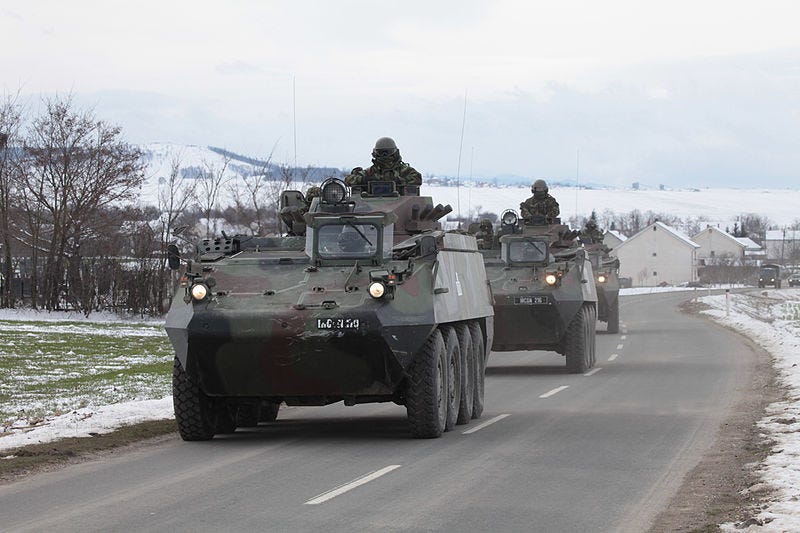
American attention is understandably focused on Ukraine, especially amid the current Congressional spending fight. But there are two other brewing conflicts that might realistically force direct Western military action within the next few years. We had best make plans now before the course of events catches us unprepared.
Kosovo
About a week ago, Serbian paramilitary groups, obviously connected to the Serbian government, conducted a sort of raid in northern Kosovo. 30 well-equipped fighters attacked a Kosovar police patrol before taking refuge in a monastery. One Kosovan was killed, as were three Serbs; two of the attackers were arrested, while the others fled. John Kirby, spokesman for the NSC, all but blamed Serbia directly, saying that the attackers had a “high level of sophistication and training” and were equipped with “military grade” weapons.

Since then, Serbian forces have deployed to the Kosovar border in large numbers and with heavy weapons—what Kirby called an “unprecedented forward deployment of artillery, tanks, and service members.”
NATO currently has about 4500 troops in Kosovo, and has, in response to the Serbian deployment, placed additional British forces on standby.
It is not likely that Serbia will take any immediate aggressive action. Aleksander Vucic has repeatedly threatened Kosovo in recent years, before backing down again and again. He has sought to maintain relations with Putin—who would obviously benefit from such an attack—while making intermittent overtures to Europe. On balance, I think he’s playing his own game, and is not a suicidal Putin puppet, and so wants to destabilize the region just enough to keep Putin happy and NATO occupied without jeopardizing his authority or his life.
If, however, he does proceed to launch an attack, NATO intervention is practically guaranteed.
Armenia
An invasion of Kosovo appears remote, but would certainly trigger intervention. An invasion of Armenia, by contrast, appears more likely, but will not necessarily force a Western response—though perhaps it should. Azerbaijan has just seized Nagorno-Karabakh, a disputed enclave largely surrounded by Azeri territory. It is technically part of Azerbaijan under international law, but is populated almost entirely by ethnic Armenians, over 100,000 of whom have fled in the last week (amounting to most of the enclave’s population). Azerbaijan, in other words, is engaged in large-scale ethnic cleansing. You can see some of the (fairly horrifying) images here.
A part of Azerbaijan’s territory, called Nakhchivan, is isolated from the rest of the country and surrounded by Armenian territory (essentially the reverse of Nagorno-Karabakh). Azerbaijan may well invade over the next few weeks in order to create a land bridge, which will establish a direct land connection to Turkey as well. It makes strategic sense: Azerbaijan has clear military superiority, and the benefits of success are obvious.

NATO as a whole can’t easily intervene, because Turkey is Azerbaijan’s chief foreign backer. But a coalition of the willing might certainly be forced to prevent further ethnic cleansing or even genocidal massacres if the conflict turns into a bloody slog. Such massacres are hardly improbable, given Azerbaijan’s barbaric conduct in the 2020 war between the two nations, its general disregard for human rights, and the ethnic tensions between the two groups. It’s a kind of Balkans 2.0.
Actually, the West probably should conduct airstrikes or even deploy peacekeeping forces in case such an invasion occurs. It’s likely to work and may prevent untold suffering. It also makes good strategic sense. Azerbaijan is a dictatorship and a Turkish ally. Armenia is a democracy. It was, of necessity, a Russian and Iranian ally until now, but Russian peacekeepers deployed to Nagorno-Karabakh entirely failed to do their job—Azerbaijan actually killed some of them without provoking any Russian response. The nation’s leaders and populace are eager to turn to the West: American advisors recently conducted a small-scale riot peacekeeping military exercise with Armenia, and France is now exploring arms shipments. It’s a great opportunity to pry away a former Russian ally while exerting pressure on Erdogan.
Update (10/1): Serbia has withdrawn some of its troops and equipment.



